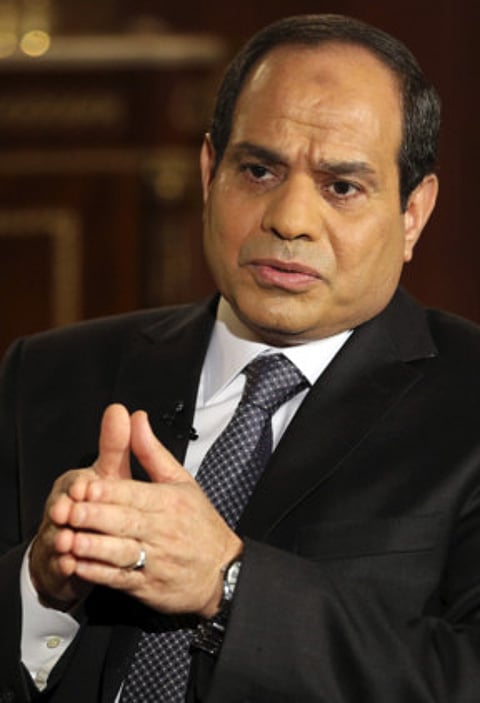Al Sissi calls for US help to battle ‘terror’
Calls for resumption of US military aid to Egypt

Cairo: Abdul Fattah Al Sissi, the general who ousted an elected Islamist president and is set to become Egypt’s next head of state, called on the United States to help fight jihadi terrorism to avoid the creation of new Afghanistan in the Middle East.
In his first interview with an international news organisation in the run-up to the May 26-27 vote, Al Sissi called for the resumption of US military aid, worth $1.3 billion a year, which was partially frozen after a crackdown on the Muslim Brotherhood.
Asked what message he has for US President Barack Obama, Al Sissi said: “We are fighting a war against terrorism.” “The Egyptian army is undertaking major operations in the Sinai so it is not transformed into a base for terrorism that will threaten its neighbours and make Egypt unstable. If Egypt is unstable then the entire region is unstable,” said a quietly spoken Al Sissi, wearing a dark civilian suit.
“We need American support to fight terrorism, we need American equipment to combat terrorism.” He said neighbouring Libya, which has descended into chaos following the Western-backed uprising that toppled Muammar Gaddafi, was becoming a major security threat to Egypt with jihadis infiltrating across the border to fight security forces.
“The West has to pay attention to what’s going on in the world - the map of extremism and its expansion. This map will reach you inevitably,” he said.
In a sideswipe at Western policy on Syria, where US and European support for rebels fighting for three years to bring down President Bashar Al Assad has seen a proliferation of jihadism and the fragmentation of the country, Al Sissi stressed the need to maintain the unity of Syria.
“Otherwise we will see another Afghanistan”, he said. “I don’t think you want to create another Afghanistan in the region.” Islamists and the Egyptian state are old enemies. Militants assassinated President Anwar Al Sadat in 1981 because of his Camp David 1979 peace treaty with Israel. Ousted president Hosni Mubarak also survived assassination attempts by jihadists.
Some of the world’s most radical militants are Egyptian, including Al Qaida leader Ayman Al Zawahri.
Al Sissi said the army was forced to intervene by a popular uprising against the Brotherhood’s partisan rule.
“The more time passes the more the vision gets clearer to everyone. People and the world realize what happened in Egypt was the will of all of the Egyptian people”, said Al Sissi at a hotel partly owned by the army.
“The army could not have abandoned its people or there would have been a civil war and we don’t know where that would have taken us. We understand the American position. We hope that they understand ours.” The Brotherhood was banned as a terrorist organisation in December. Former president Mohammad Mursi, ousted in July after mass protests, is facing capital charges, while the group’s spiritual guide, Mohammad Badie, has been sentenced to death along with hundreds of supporters among the Brothers.
The past nine months have also seen a rekindling of jihadi insurgency in the lawless Sinai peninsula with numerous lethal attacks on targets in Egypt’s cities. Several hundred policemen and soldiers were killed in attacks last year after the government killed hundreds of Mursi’s supporters in August in the bloodiest crackdown in Egypt’s modern history.
Al Sissi, treated as a saviour in a personality cult that grew after his overthrow of Mursi last July, says he is conscious of the challenges facing Egypt after more than three years of turmoil since the overthrow of Mubarak.
But he dismisses the idea of a US-style 100 days policy blitz to give Egyptians the bread, freedom, security and social justice they yearn for.
“The truth is one hundred days is not enough. The challenges present in Egypt are so many,” Al Sissi said. “I believe that within two years of serious, continuous work we can achieve the type of improvement Egyptians are looking for.” Political turmoil and violence have hammered Egypt’s economy, which the government forecasts will grow only up to 2.5 per cent in this fiscal year. The Egyptian pound has hit record lows, weakened by the absence of foreign investors and tourists.
“We have to admit that the economic situation in Egypt is difficult, and not just over the last three years. Egyptians were aspiring to a more stable life than the reality we are living in. More than 50 per cent of the Egyptian people suffer from poverty. There is a lot of unemployment,” said Al Sissi.
Gulf states poured billions of dollars in aid into Egypt to prop up the economy. Al Sissi would not predict when Egypt would no longer need that aid but said Egypt needed to stand on its own feet.
“We don’t see this as a good thing, frankly, and hope it ends as soon as possible.” He said relations between Egypt and Israel, which have a peace treaty together, have been stable for more than 30 years despite many challenges.
“We respected it (the peace treaty) and we will respect it.
The Israeli people know this ... The question of whether we would be committed to the peace treaty is over with,” he said.
Egypt, which has mediated between Palestinians and Israelis, was ready to help revive deadlocked peace talks.
“We need to see a Palestinian state. We need to move on peace, which has been frozen for many years. There will be a real chance for peace in the region. We are ready to play any role that will achieve peace and security in the region,” he added.

![Oman’s Maritime Security Centre confirmed four crew members injured. [Illustrative image. ]](http://media.assettype.com/gulfnews%2F2026-03-01%2Fv5np7wj5%2FOil-tanker.jpg?w=320&auto=format%2Ccompress&fit=max)

